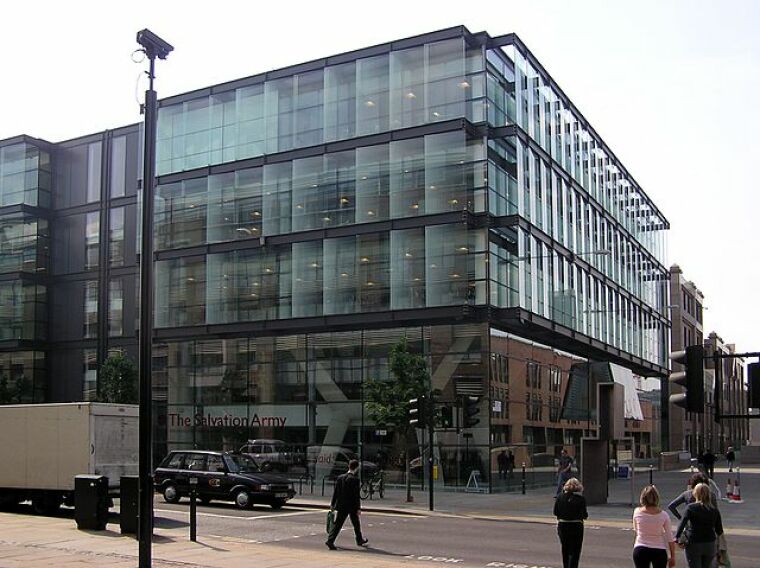Salvation Army releases film to help public identify signs of modern slavery

The Salvation Army has released a short animated film aimed at helping the public identify common signs of modern slavery so they could report the crime to proper authorities.
The film, which was released ahead of Anti-Slavery Day on Oct. 18, shows the viewers some everyday indicators of modern slavery and takes them through common encounters people have with the victims. It also tells the viewers where to go for information or report suspicious activity.
"We now need everyone in the UK to recognise the uncomfortable truth that modern slavery is taking place all around us," said Major Anne Read, the Salvation Army's Director of Anti Trafficking and Modern Slavery.
"Everyone should make it their business to understand what to look for and who to tell and we'd urge anyone who wants to join our fight against modern slavery to watch the animation we've made, to help them know what the signs are to look out for, that anyone could come across in everyday life," she added.
The Christian charity also released a film about modern slavery last year, in which Princess Eugenie of York urged the public to ask businesses who make goods and services to review their supply chain for slave labor through social media using the hashtags, #askthquestion and #slavefree.
Earlier this year, the princess continued her encouragement to survivors and those working in the field when she met with former victims who are now recovering at a Salvation Army safe house in Yorkshire.
"For me these amazing women are such an inspiration in the courage they show in overcoming what has happened to them and their desire to help others," the princess stated, according to Premier.
"It is important that everyone understands the reality of the horrendous experiences these women have had to face and that this kind of exploitation is happening every day in every community in our country," she continued.
The Salvation Army noted that there has been a 300 percent increase in the number of modern slavery victims that were referred for support in the past six years. The number of referrals reportedly rose from 378 in 2011 to 1,554 last year, reflecting both the rising number of modern slaves in the U.K. as well as an improvement in the identification of victims.
The increase includes the doubling in number of Vietnamese men who were trafficked to work in illegal cannabis farms.
Forty-eight percent of those referred to the government program was brought to the U.K. for sexual exploitation, 39 percent for labor exploitation and 13 percent for domestic servitude, according to the charity's figures.
The Salvation Army provides accommodation for a set period for victims referred to the charity, and it also offers legal advice and information about whether they can stay in the U.K. and apply for work, or whether they must return to their home country.
 Christians don't have to affirm transgenderism, but they can’t express that view at work: tribunal
Christians don't have to affirm transgenderism, but they can’t express that view at work: tribunal Archaeology discovery: Medieval Christian prayer beads found on Holy Island
Archaeology discovery: Medieval Christian prayer beads found on Holy Island Presbyterian Church in America votes to leave National Association of Evangelicals
Presbyterian Church in America votes to leave National Association of Evangelicals Over 50 killed in 'vile and satanic' attack at Nigerian church on Pentecost Sunday
Over 50 killed in 'vile and satanic' attack at Nigerian church on Pentecost Sunday Ukrainian Orthodox Church severs ties with Moscow over Patriarch Kirill's support for Putin's war
Ukrainian Orthodox Church severs ties with Moscow over Patriarch Kirill's support for Putin's war Islamic State kills 20 Nigerian Christians as revenge for US airstrike
Islamic State kills 20 Nigerian Christians as revenge for US airstrike Man who served 33 years in prison for murder leads inmates to Christ
Man who served 33 years in prison for murder leads inmates to Christ


 Nigerian student beaten to death, body burned over ‘blasphemous’ WhatsApp message
Nigerian student beaten to death, body burned over ‘blasphemous’ WhatsApp message 'A new low': World reacts after Hong Kong arrests 90-year-old Cardinal Joseph Zen
'A new low': World reacts after Hong Kong arrests 90-year-old Cardinal Joseph Zen Iran sentences Christian man to 10 years in prison for hosting house church worship gathering
Iran sentences Christian man to 10 years in prison for hosting house church worship gathering French Guyana: Pastor shot dead, church set on fire after meeting delegation of Evangelicals
French Guyana: Pastor shot dead, church set on fire after meeting delegation of Evangelicals ‘Talking Jesus’ report finds only 6% of UK adults identify as practicing Christians
‘Talking Jesus’ report finds only 6% of UK adults identify as practicing Christians Mission Eurasia ministry center blown up in Ukraine, hundreds of Bibles destroyed: 'God will provide'
Mission Eurasia ministry center blown up in Ukraine, hundreds of Bibles destroyed: 'God will provide' Church holds service for first time after ISIS desecrated it 8 years ago
Church holds service for first time after ISIS desecrated it 8 years ago Burger King apologizes for 'offensive campaign' using Jesus' words at the Last Supper
Burger King apologizes for 'offensive campaign' using Jesus' words at the Last Supper Uganda: Muslims abduct teacher, burn him inside mosque for praying in Christ’s name
Uganda: Muslims abduct teacher, burn him inside mosque for praying in Christ’s name